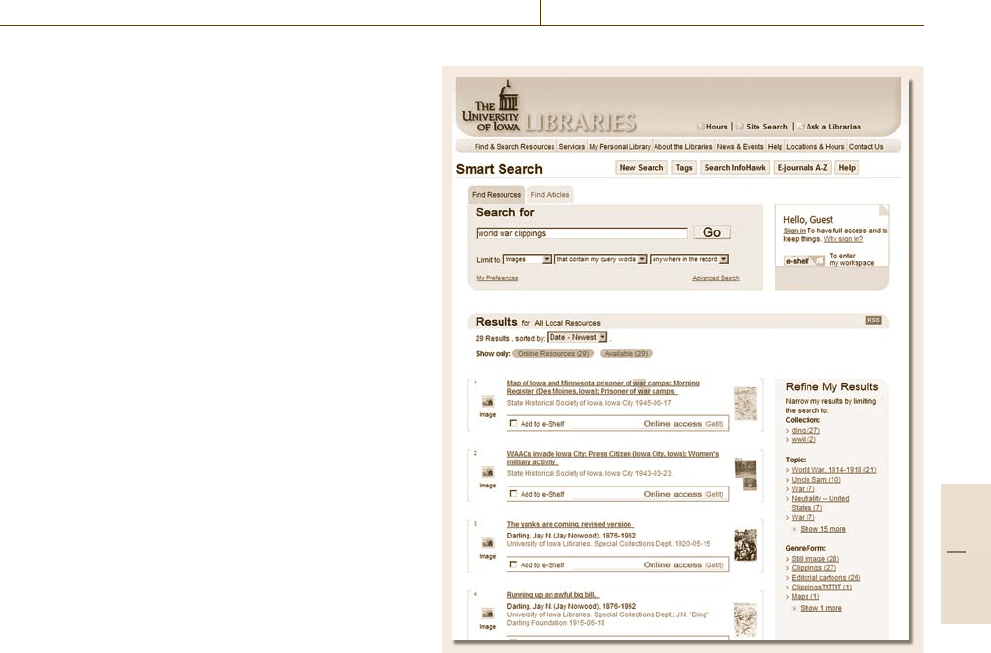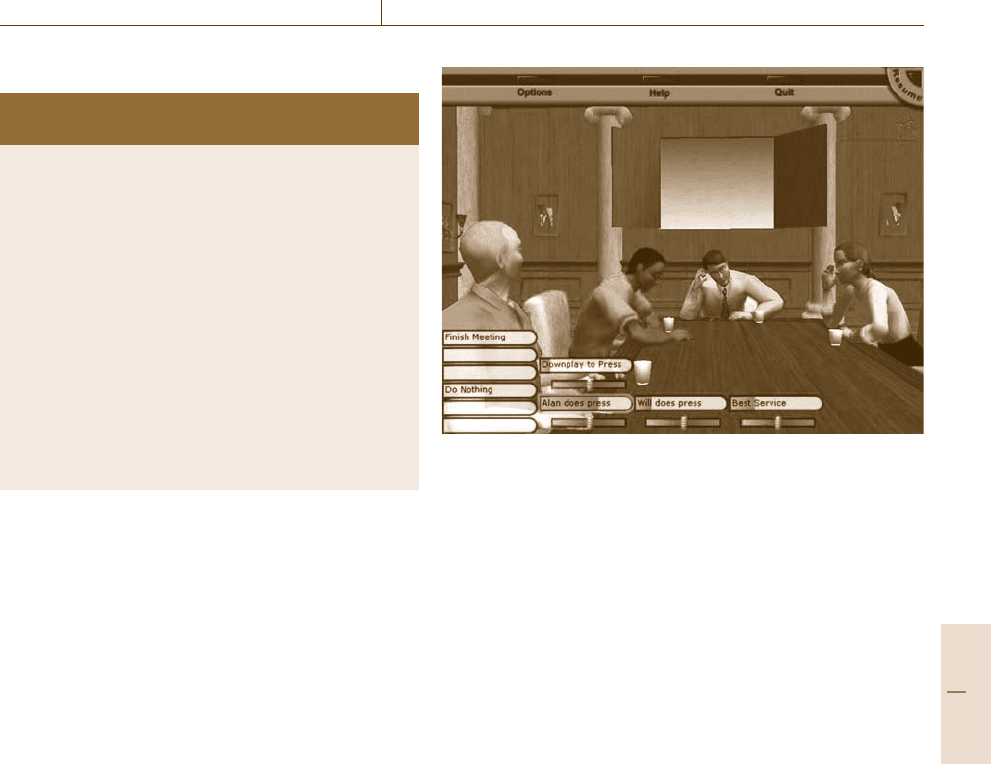Nof S.Y. Springer Handbook of Automation
Подождите немного. Документ загружается.


Library Automation 72.3 OpenURL Linking and the Rise of Link Resolvers 1295
per discusses the new functionality that has been
enabled, the implementation process and system
architecture, assessment of the new catalog’s per-
formance, and future directions.
Other new players have also entered the market for
new library delivery systems, generally called NextGen
or discovery-to-delivery (D2D) systems. AquaBrowser
is another example of a pure-OPAC replacement with
no pretensions of replacing the complete range of ILS
functions. Among more traditional library vendors, In-
novative Interfaces has released its product, Encore
(http://www.iii.com/encore), and Ex Libris its prod-
uct, Primo (http://www.exlibrisgroup.com/primo.htm).
Both were developed with a group of partners and both
tout a one-stop solution for the discovery and delivery
of information.
Ex Libris’s choice of development partners was
perhaps the more atypical in that one of its part-
ners, Vanderbilt University, was particularly keen to use
Primo to combine its library catalog, Acorn, with a fa-
cility to enable easy discovery and delivery of its unique
Television News Archive [72.29]:
The Television News Archive collection at Vander-
bilt University is the world’s most extensive and
complete archive of television news. The collection
holds more than 30 000 individual network evening
news broadcasts from the major US national broad-
cast networks: ABC, CBS, NBC, and CNN, and
more than 9000 hours of special news-related pro-
gramming including ABC’s Nightline since 1989.
The University of Iowa had a different goal, namely
to push exposure of many of its otherwise isolated
digital collections. These collections, which developed
over time and throughout the institution, possess no na-
tive discovery interface and consequently suffer from
a widespread lack of awareness. With Primo as its
unifying discoverytool, theuniversitycan provide a sin-
gle search interface to all of its rich collections. One
notable example is the university’s and the Iowa His-
torical Society’s World War II newspaper clippings
collection.
The Primo discovery and delivery system enables
libraries to present their collections in an entirely new
way, providing users with the ability to access a wealth
Fig. 72.7 Primo at the University of Iowa: an example of the new
D2D paradigm
of authoritative information from a single point. Central
to the development of Primo has been the concept of
harvesting and publishing as the means whereby a sin-
gle, Google-like search interface can provide rapid and
easy, normalized and enriched discovery for the entire
range of resources under the control of the institution:
local catalogs, locally digitized collections harvested
by the open archieves initiative protocol for metadate
harvesting (OAI-PMH) collections, and so forth. Primo
is integrated with both metasearching (MetaLib) and
OpenURL linking (SFX) to enable discovery in a vast
range of external resources, with onward navigation and
other services via the OpenURL syntax. In this way
the institution can satisfy its users’ desire for almost
instantaneous response to simple queries while provid-
ing the ability to search a vast array of databases and
e-Resources that are not held locally.
Part G 72.3

1296 Part G Infrastructure and Service Automation
72.4 Future Challenges
Libraries and librarians have frequently stood at the
forefront of the information revolution. The MARC for-
mat was a model of interinstitutional and international
collaboration in its time. As libraries and their vendors
evolved, though, large installed bases of customers and
data made further change that much more challenging.
At the same time, libraries became but one outpost on
the information frontier. The growth of the Internet, the
World Wide Web, and the rise of newer information
industry players such as Google and Amazon have all
combined to put libraries on the defensive. Libraries
have now come to realize that standards such as unicode
and XML can be exploited for their benefit by partak-
ing of a global information chain. Librarians have come
to grasp the significance of capturing information at its
earliest stage and repurposing it throughout its lifetime,
all the while continuing to add value to the information
content package.
Almost 20years after the advent of the integrated li-
brary system, we are witnessing the opening wedge in
the dissolution of the ILS into a series of independent
modules that communicate with each other by means
of Web 2.0 services. These new discovery-to-delivery
solutions are indeed, on the one hand, OPAC or OPAC-
plus replacements and designed to work with a variety
of vendor systems, but they are at the same time the first
in a series of new librarysystem modules that will likely
appear over the next decade [72.30, 31]. As the indus-
try continues to evolve, and as open systems respond to
the demands of Web 2.0, we can expect the Integrated
Library System to morph into a strategy based on the
survival of the best-of-breed. The future will be one of
distinct functional modules that communicate with one
another by exploiting the concept of unified resource
management (URM) [72.32].
Responding to the requirements and demands of the
digital era, where e-Resources proliferate and dominate
the publishingand acquisitions scene, the venerable ILS
acquisitions and serials modules are already showing
sings of coalescing around the ERM model. The ERM,
with support for licensing and the other key attributes
of e-Content, will replace the traditional systems which
are oriented largely toward print and nonprint analogs
(maps, kits, scores, sound recordings, etc.).
As the ILS gives way to the URM,andtheURM
becomes the predominant model for the third gener-
ation of library management systems, management of
e-Content will no longer be an afterthought. The chal-
lenge for libraries, librarians, and vendors alike will be
to develop a system, or perhaps a series of intercon-
nected systems, that can inherently manage all manner
of information content, both traditional and digital, and
do it by exploiting both content and metadata from the
very cradle of their existence.
72.5 Further Reading
72.5.1 General Overview
•
R.W. Boss: The Library Administrator’s Au-
tomation Handbook (Information Today, Medford
1997)
•
M.D. Cooper: Design of Library Automation Sys-
tems (Wiley, New York 1995)
•
T.R. Kochtanek, J.R. Matthews: Library Informa-
tion Systems: From Library Automation to Dis-
tribution Information Access Solutions (Libraries
Unlimited, Westport 2002)
•
Public Library Association: Tech notes section
(updated regularly).
http://www.ala.org/ala/mgrps/divs/pla/
plapublications/platechnotes/index.cfm (last ac-
cessed 2009)
72.5.2 Specific Topics
Automated Authority Control Services
Of all the vendors that existed to provide automated
outsourcing of authority records in the 1990s (Black-
well’s, WLN, OCLC, Marcive, Library Technologies,
etc.), few are still functioning: see, for example,
•
Library Technologies: Official homepage. (2008)
http://www.librarytech.com
•
MARCIVE: Official homepage. (2008)
http://www.marcive.com
Interlibrary Loan Services
•
For a broad listing of interlibrary loan products
and vendors, see http://www.cdlc.org/Resource
Sharing/ill/illproducts.shtml
Part G 72.5

Library Automation References 1297
•
For an overview, see http://en.wikipedia.org/wiki/
Interlibrary
loan
•
For information on two widely used software prod-
ucts, seeILLiad (Interlibraryloan managementsoft-
ware): http://www.oclc.org/illiad/, Clio software:
http://cliosoftware.com/public/
•
Online Computer Library Center (OCLC): The fu-
ture is now: the convergence of reference and
resource sharing, Proc. OCLC Symp., ALA Mid-
winter Conference (OCLC, Dublin 1996)
RFID/Self-Checkout Services
•
R.W. Boss: RFID technology for libraries. (updated
2007), http://www.ala.org/ala/mgrps/divs/pla/
plapublications/platechnotes/RFID-2007.pdf (last
accessed 2009)
Virtual Reference Services
•
R.W. Boss: Virtual reference. (updated 2007),
http://www.ala.org/ala/mgrps/divs/pla/
plapublications/platechnotes/Virtuel
reference.pdf
(last accessed 2009)
•
L.W. Healy, S. Brown, L. Barrett: Creating the
Virtual Reference Desk: The Decision to Take Ref-
erence Live and Online (Outsell, Burlingame 2002)
•
D.K. Kovacs: The Virtual Reference Handbook: In-
terview and Information Delivery Techniques for
the Chat and e-Mail Environments (Neal-Schuman,
New York 2007)
•
R.D. Lankes (ed.): The Virtual Reference Desk:
Creating a Reference Future (Neal-Schuman, New
York 2006)
•
A.G. Lipow: The Virtual Reference Librarian’s
Handbook (Library Solutions, Berkeley 2003)
For one specific vendor product, see
•
Online Computer Library Center (OCLC): Ques-
tionPoint (2009). http://www.oclc.org/questionpoint/
default.htm (cooperative virtual reference) (last ac-
cessed 2009)
References
72.1 V. Porter: Continuous library catalog card, Patent
4005810 (1976), This represents a computer-area
patent on the original library catalog card.
http://www.google.com/patents?
vid=USPAT4005810 (last accessed 2009)
72.2 T.-A. Wong: Card catalogs and card catalog
drawers, Patent 5257859 (1993), This represents
atweakontheoriginaldesignofthecard
catalog drawer. http://www.google.com/patents?
vid=USPAT5257859 (last accessed 2009)
72.3 University of Pennsylvania: Cards from rapidly-
disappearing card catalog. (Philadelphia 2008),
http://www.library.upenn.edu/exhibits/
pennhistory/library/cards/cards.samples.html (last
accessed 2009)
72.4 Online Computer Library Center (OCLC): OCLC catalog
cards. (Dublin 2008), http://www.oclc.org/support/
documentation/worldcat/cataloging/cards/
default.htm (last accessed 2009)
72.5 K. Coyle: Catalogs, card – and other anachronisms,
J. Acad. Librarians 31(1), 60–62 (2005)
72.6 H. Avram: Obituary, with reference to the MARC
project. (2006), http://www.nytimes.com/2006/05/
03/us/03avram.html?ex=1304308800&en=
60308f72d854136a&ei=5088&partner=
rssnyt&emc=rss (last accessed 2009)
72.7 F. Kilgour: Obituary, with reference to the founding
of OCLC. (2006), http://www.oclc.org/news/releases/
200631.htm (last accessed 2009)
72.8 Online Computer Library Center (OCLC): Official
homepage. http://www.oclc.org (last accessed
2009)
72.9 C.M. Goldstein: Integrated library systems, Bull.
Med. Libr. Assoc. 71(3), 308–311 (1983)
72.10 E.G. Fayen: Integrated library systems, Encyclop.
Libr. Inform. Sci. 1(1), 1–12 (2004)
72.11 C. Lynch: From automation to transformation:
forty years of libraries and information technology
in higher education, Educause Rev. 35(1), 60–68
(2000)
72.12 T. Primich, C. Richardson: The integrated library
system: from innovation to relegation to innova-
tion again, Acquis. Libr. 18(35–36), 119–133 (2006)
72.13 T.R. Kochtanek, J.R. Matthews: Library Information
Systems: From Library Automation to Distributed
Information Access Solutions (Libraries Unlimited,
Westport 2002)
72.14 R. De Gennaro: A computer produced shelf list, Coll.
Res. Libr. 31(5), 318–331 (1970)
72.15 T. Robinson: Personal Communication (Harvard
Univ. Office for Information Systems, Harvard
2007)
72.16 Elsevier: Endeavor merges with Elsevier Science,
American Libraries (2000)
72.17 P. Caplan: Information on the appropriate
copy problem (2001). http://www.dlib.org/dlib/
september01/caplan/09caplan.html (last accessed
2009)
Part G 72

1298 Part G Infrastructure and Service Automation
72.18 NISO: Information on NISO’s OpenURL standard.
(updated 2008), http://www.niso.org/standards/
index.html (last accessed 2009)
72.19 NISO: NISO metasearch initiative (2006),
http://www.niso.org/workrooms/mi (last accessed
2009)
72.20 Harvard Crimson: e-Resource elation. (2005),
http://www.thecrimson.harvard.edu/
article.aspx?ref=508846 (last accessed 2009)
72.21 DSpace: Official homepage. http://www.dspace.org
(last accessed 2009)
72.22 Fedora: Official homepage. http://www.fedora.info
(last accessed 2009)
72.23 National Library of New Zeland: Information on the
NLNZ project. (updated 2008),
http://www.natlib.govt.nz/about-us/current-
initiatives/ndha (last accessed 2009)
72.24 Digital Library Federation: Electronic resource
management. (2004), http://www.diglib.org/
pubs/dlf102/ (last accessed 2009)
72.25 Online Computer Library Center (OCLC): Percep-
tions of libraries and information resources. (2005)
http://www.oclc.org/reports/2005perceptions.htm
(last accessed 2009)
72.26 D. Flecker: OPACS and our changing environment:
observations, hopes, and fears (2005).
http://www.loc.gov/catdir/pcc/archive/
opacfuture-flecker.ppt (last accessed 2009)
72.27 Endeca: Official hompepage.
http://www.endeca.com (last accessed 2009)
72.28 K. Antelman, E. Lynema, A.K. Pace: Toward
a twenty-first century library catalog, Libr. Inform.
Technol. Assoc. 25(3), 128–139 (2006),
http://www.ala.org/ala/mgrps/div/lita/252006/
number3september/antelman.cfm (last accessed
2009)
72.29 Vanderbilt University: Television News Archive.
(Nashville 2008), http://tvnews.vanderbilt.edu/
(last accessed 2009)
72.30 M. Breeding: Trends in library automation: meet-
ing the challenges of a new generation of li-
brary users. (2006). http://www.oclc.org/programs
andresearch/dss/ppt/breeding.ppt (last accessed
2009)
72.31 R. Dietz, C. Grant: The disintegrating world
of library automation, Libr. J. 130(11), 38–
40 (2005), http://www.libraryjournal.com/article/
CA606392.html (last accessed 2009)
72.32 J.E. Grogg: Investing in digital, Libr. J. 132(9), 30–
33 (2007), http://www.libraryjournal.com/article/
CA6440577.html (last accessed 2009)
Part G 72

1299
Automating S
73. Automating Serious Games
Gyula Vastag, Moshe Yerushalmy
In this chapter, we present the theoretical under-
pinnings of and conditions for learning through
experiences gained in immersive learning sim-
ulations (or simply gaming) and show some
examples of authentic learning experiences
for business professionals. We argue that re-
cent developments in the theory of knowledge
acquisition coupled with changes in the ed-
ucational landscape (e.g., the proliferation of
online courses and programs) present an unri-
valled and so far mostly unexploited opportunity
for serious games. The examples presented are
from using Managerial Enterprise Resource Plan-
ning (MERP) in a variety of MBA and corporate
business training programs. Related examples
of other virtual learning environments are also
included.
73.1 Theoretical Foundation
and Developments:
Learning Through Gaming.....................1299
73.2 Application Examples............................1303
73.2.1 MERP ..........................................1303
73.2.2 L’Oreal e-Strat .............................1306
73.3 Guidelines and Techniques
for Serious Games.................................1306
73.3.1 The Serious Game Solution
for e-Learning Characteristics ........1306
73.3.2 The Virtual World for Learning
by Doing Characteristics ................1306
73.3.3 Supporting the Learning
by Doing Characteristics ................1308
73.4 Emerging Trends, Open Challenges.........1309
73.5 Additional Reading...............................1310
References ..................................................1310
73.1 Theoretical Foundation and Developments:
Learning Through Gaming
It is widely accepted that “serious games are (digital)
games used for purposes other than mere entertain-
ment” [73.1]. Michael and Chen [73.2] give a similar
definition: “A serious game is a game in which educa-
tion (in its various forms) is the primary goal, rather
than entertainment.” The market for serious games is
growing rapidly as more and more organizations are
adopting or expected to adopt them in their training
programs.
Conceptually, serious games are related to and
somewhatoverlap with thefollowingterms: e-Learning,
edutainment, game-based learning, and digital game-
based learning [73.1]. In 2002, the Woodrow Wil-
son Center for International Scholars (in Wash-
ington, DC) founded the Serious Games Initiative
and the term, following the first Serious Games
Summit held in 2004, became generally accepted
(http://www.seriousgames.org/) and a growing num-
ber of scholars began working in this field. Most
recently, Sawyer and Smith developed a taxonomy of
serious games and made it available on the organi-
zation’s website (http://www.dmill.com/presentations/
serious-games-taxonomy-2008.pdf), and Table 73.1
provides a synthesis of applications in different seg-
ments in society.
The illustrative applications of serious games in-
clude, but are certainly not limited to, disaster prepared-
ness, health care, military training, and education, the
main focus of this chapter (Table 73.2). For a related
discussion of the role of automation in education also
see Chaps. 44 and 85. Breslin et al. [73.3] describe
how a game is used to execute and assess the effective-
ness ofalternative strategies forresponding toa disaster.
Kelly et al. [73.4] introduce Immune Attack, a personal
computer (PC)-based game, used for learning the rules
of the immune system and revealing deeper insights.
Part G 73

1300 Part G Infrastructure and Service Automation
Table 73.1 Taxonomy of serious games (courtesy of Sawyer and Smith)
Games
for health
Advergames Games
for training
Games
for
education
Games
for science
and
research
Production Games
aswork
Government
and NGO
Public
health
education
and mass
casualty
response
Political
games
Employee
training
Inform
public
Data
collection/
planning
Strategic
and policy
planning
Public
diplomacy,
opinion
research
Defense Rehabilita-
tion and
wellness
Recruitment
and
propaganda
Soldier/
support
training
School
house
education
Wargames/
planning
War plan-
ning and
weapons
research
Command
and control
Healthcare Cyber-
therapy/
exergaming
Public
health
policy
and social
awareness
campaigns
Training
games for
health pro-
fessionals
Games for
patient
education
and disease
management
Visualization
and epi-
demiology
Biotech
manufac-
turing and
design
Public
health
response
planning
and
logistics
Marketing
and
commu-
nications
Advertising
treatment
Advertising,
marketing
with games,
product
placement
Product use Product
information
Opinion
research
Machinima Opinion
research
Education Inform
about
diseases/
risks
Social issue
games
Train
teachers/
train work-
force skills
Learning Computer
science and
recruitment
P2P
learning
construc-
tivism
documen-
tary?
Teaching
distance
learning
Corporate Employee
health
information
and wellness
Customer
education
and
awareness
Employee
training
Continuing
education
and
certification
Advertising/
visualization
Strategic
planning
Command
and control
Industry Occupational
safety
Sales and
recruitment
Employee
training
Workforce
education
Process
optimization
simulation
Nano/
biotech
design
Command
and control
America’s Army (www.americasarmy.com) was intro-
duced at the 2002 Electronics Entertainment Expo and
was, after some initial hesitation, officially embraced
and supported by the United States (US) Army as an
effective military training simulator [73.5].
In addition to the wide variety of applications, the
theoretical underpinnings of learning through gaming
were also explored. Although Gros [73.6]hassome
reservations about the current status of research in the
educational use of computers (specifically, he cautions
that research inthis area is still disjointed),he andothers
also point to some common understanding and princi-
ples of learning. First, there are publications showing
the advantageous effects of computer games. Green-
field [73.7, p. 29] reported that “more skilled video
game players had better developed attentional skills
Part G 73.1

Automating Serious Games 73.1 Theoretical Foundation and Developments: Learning Through Gaming 1301
Table 73.2 Serious game types and application examples
Seriousgame
types
Application examples
Game-based
education
Game-based learning,
edutainment, learning games
Game-based
production
Game-based authoring,
machine behaviors
Game-based
simulation
Game-based simulator,
simulation games
Game-based
messaging
Game-based advertisement,
game-based marketing,
advergaming
Game-based
training
Game-based trainer
Game-based
interface
Game-like interface,
game-based graphical user
interface (GUI)
than less skilled players.” Backlund et al. [73.8]wrote
about the positive impact that playing computer games
had on traffic school students’ driving behavior. Koepp
et al. [73.9] showed that playing video games stim-
ulates substantial dopamine release and that gamers’
performance was related to the amount of dopamine
present. Considering that dopamine is a chemical pre-
cursor to the memory storage event, it can be argued,
they write, that video games are able to chemically
prime the brain for learning. Furthermore, they write
(p. 34) that “Beyond science and engineering games,
further evidence suggests that games teach not only
facts but detailed reasoning applicable to life’s many
challenges” (Fig.73.1).
Mayo [73.10, pp. 32–34] listedseven characteristics
that enable video games to address the deficiencies of
education, specifically the shortcomings of big lecture
formats typically used at universities.
1. Massive reach of players/participants.
2. Experiential learning (If you do it, you learn it). In
games, players must navigate game scenarios and
make decisions with consequences.
3. Inquiry-based learning (What happens when I do
this?). This is the dominant philosophy in science
and is also a natural mode for many video games
that support freeform exploration, discovery, and
experimentation.
4. Self-efficacy (If you believe you can do it, you’ll
try longer/harder, and you’ll succeed more often
Fig. 73.1 Leadership development to assess critical reasoning using
a virtual environment (courtesy of SimuLearn)
than you would otherwise). In games, points, lev-
els or magic swords are awarded at positive decision
points, encouraging players to keep going.
5. Goal setting (You learn more if you are working to-
ward a well-defined goal). All games have goals,
a key distinction between games and simulations.
6. Cooperation (team learning). Studies of classroom
techniques show that cooperative learning results
in about a 50% improvement over either solo or
competitive learning. Some types of games (such as
massive multiplayer online games) are intrinsically
structured as a team effort toward a common goal.
7. Continuous feedback and tailored instruction.
Corti [73.11] coined the term immersive learning
simulation (ILS) and pointed out that many corporate
learning professionals and suppliers of ILS are not
aware of what is needed to create a truly effective and
appropriate learning solution. His call is supported by
Zyda [73.12] who writes about the reasons supporting
the need to deploy immersive storytelling in service to
society in the interactive realm. Shaffer et al. [73.13,
p. 7] argue that
Games are powerful contexts for learning because
they make it possible to create virtual worlds, and
because acting in such worlds makes it possible to
develop the situated understandings, effective so-
cial practices, powerful identity, shared values, and
ways of thinking of important communities of prac-
tice.
Part G 73.1

1302 Part G Infrastructure and Service Automation
An example of such a virtual world is presented in the
sequence of screenshots in Fig.73.2.
Writing about computer-supported collaborative
learning (CSCL), Salomon et al. [73.14] used the term
cognitive residue to refer to a byproduct effect of learn-
ers interaction withmedia [73.15].By cognitiveresidue,
they meant [73.15,p.3andp.6]
a)
b)
c)
d)
subsequent changes in mastery of knowledge, skill
or depth of understanding away from the computer
[...] higher order thinking skills that are either ac-
tivated during an activity with an intellectual tool
or are explicitly modeled by it can develop and can
be transferred to other dissimilar, or at least similar
situations.
These cognitive effects are effects with technology
obtained during intellectual partnership with it, and ef-
fects of it in terms of the transferable cognitive residue
that this partnership leaves behind in the form of better
mastery of skills and strategies.
It has long been confirmed that learning and do-
ing are tightly linked, as learning typically involves
activities as well [73.16]. Many professionals, includ-
ing current and would-be business managers, are action
oriented; they learn to do something that later is to im-
prove business operations. Schon [73.17] called the link
between knowing and doing a reflective practice.
Professional societies (e.g., for doctors, lawyers,
managers) develop supervised settings, residencies for
doctors or moot courts for lawyers, where a learner can
develop his/her skills by trying a course of action and
then reflecting on the results together with his peers and
mentors. During this course of action, learners develop
epistemic frames of knowledge that are [73.16]:
the conventions of participation that individuals
internalize when they become acculturated. The
reproductive practices of the community are the
means by which new members develop that epis-
temic frame.
There is a clear message here: learning does not hap-
pen in a vacuum; communities of practice or affiliation
groups provide elements of the good learning that
include goals, interpretations, practice, explanations,
Fig. 73.2a–d The friction explorer allows users to see how
a sliding object behaves when the force applied to push
it and the coefficient of friction are modified.
(a) With an
applied force of 0 and coefficient of friction of 9, the ob-
ject does not move;
(b) with an applied force of 2 and
a coefficient of friction of 2 the object barely moves;
(c) with an applied force of 9 and a coefficient of 0 the
object slides off the table;
(d) with an applied force of 9
and a coefficient of friction of 9 the object moves about
one-third of the width of the table (courtesy of Schlum-
berger Excellence in Educational Development (SEED)
http://www.seed.slb.com/en/index.htm)
Part G 73.1

Automating Serious Games 73.2 Application Examples 1303
debriefing, and feedback [73.18]. Serious games rep-
resent a clear opportunity to create communities of
practice for business professionals.
In all settings or contexts, learning is about content
acquisition while games typically focus on experi-
ence [73.19]. In other words, there is content (facts,
principles, information, skills) that has to be learned.
Gee [73.18] argues that indirect teaching of content
(that is, teaching content via something else) is supe-
rior to the traditional approach used by schools, which
teach content directly. Serious games can be that some-
thing else that helps in content acquisition by providing
a variety of authentic learning experiences that mimic
those of professional societies.
New results in learning theory [73.20,21] show that
people primarily think and learn through experiences
they have had, assuming that these experiences meet
certain conditions. Gee [73.22] summarized these five
conditions as follows:
1. Experiences are most useful for future problem
solving if they are structured by specific goals
2. For best learning, experiences must be interpreted
by extracting the lessons learned
3. Learning is enhanced if immediate feedback is pro-
vided so that the learners can recognize and evaluate
their errors
4. Learners need ample new opportunitiesto apply and
reapply their previous experiences
5. Learners need to learn from interpreted experiences
and explanations of other people, both peers and
experts.
Gee’s situated learning matrix [73.18,22] refers to
the linkage between content and identity. Content is
given in the context of a goal-driven problem space.
Learners move through similar problems representing
various contexts and learn to interpret and generalize
their experiences in these contexts. In video games, for
example, players can get lots of practice at a given level
and can then apply what they have learned in less fa-
miliar situations (across levels, for example). Through
offering learning in varied contexts, the problem of
context-specific learning is solved; for example, learn-
ing through a case study may leave the learner with
knowledge that is specific to the given case but can-
not easily be generalized to other settings. On the other
end of the spectrum, learning out of context, focus-
ing on principles only, for example, may give learners
knowledge that cannot be applied.
Learning, in Gee’s view, moves from identity to
goals and norms, to tools and technologies, and only
then to content. Identity has been linked to two char-
acteristics that enhance learning. First, the ability of
the players to have microcontrol over some elements of
the game extends and creates an, as Gee [73.22]wrote,
“embodied empathy for a complex system.” The second
characteristic is the learner’s motivation for and own-
ership over the successful outcome of the game. The
often quoted saying is that success is based on experi-
ence and experience comes from failures. A lot can be
learned from a failed business or from not reaching the
next level in a game. If the players are motivated to take
risks, try out new ideas, and eventually, learn from the
experiences, then the game has a good design.
73.2 Application Examples
Two illustrative examples of serious games are intro-
duced and discussed in this section:
•
Management Enterprise ResourcePlanning (MERP)
– a dynamic, real-time-based online simulation
aimed at strategy execution
•
L’Oreal e-Strat –an onlinestrategic business market
competition game aimed at exploring various strate-
gies by teams of managers who compete in the same
market.
73.2.1 MERP
MERP was developed to facilitate learning by offering
a variety of managerial contexts in which good prac-
tices can be discovered and practised (for details, see
http://www.mbe-simulations.com).
Unlike the usual static, written case studies, the
dynamic case study scenarios (DCSS) by MBE Sim-
ulations offer a live business environment with com-
puterized scenarios that the students must manage and
thereby control the destiny of their own business op-
erations. Students participate in a virtual organization
that is made real and dynamic as minute-by-minute
business events and conditions unfold. Students must
respond to and make complex managerial decisions
in real-time based on the big picture view. While tra-
ditional strategic business games deal with results on
a periodic basis (i.e., monthly, quarterly or yearly),
the MERP experience involves real-time execution of
Part G 73.2

1304 Part G Infrastructure and Service Automation
strategies and the results are shown by key performance
indicators (KPI).
MERP consists of a whole suite of scenarios that
cover practices at various levels of complexity and
scope. Focusing on individual departments (such as
production, purchasing, and others in a production
environment), as well as different industrial business
processes (make-to-stock versus make-to-order), cus-
tomer orders and client contracts fluctuate, allowing
the use of different management models and inventory
purchasing replenishment methods [e.g., the materials
resources planning (MRP) mechanism or order level
inventory policies]. Students can integrate theory into
practice while they learn to test, retest, think, and re-
think constantly in various real-life, dynamic situations.
Since 2001, MERP has been used both in traditional
and online settings to teach operations and supply-chain
management coursesfor MBAs. These courses involved
about 500 students at the Stuttgart Institute of Manage-
ment and Technology (Stuttgart, Germany), the Kelley
School of Business (Kelley Direct Online MBA Pro-
gram at Indiana University, USA), the CEU Business
School (Budapest, Hungary) and the Corvinus School
of Management (Budapest, Hungary). Typically, about
30–35% of the total points were assigned to MERP-
related work. The simulation software covers the full
supply chain of fictitious companies. Generally, stu-
Fig. 73.3 Simulation: management view
dents have to work with three scenarios that differ
in customer segmentation (small individual customers
and/or clients with long-term contracts), product rout-
ings (flow shops and job shops), level of variability or
randomness, and number of suppliers and final prod-
ucts. Teams of students have to manage these fictitious
companies and make a variety of interrelated, complex
decisions, so the simulation serves as an integrating
theme.
One ofthe first decisionsis to choose the key perfor-
mance indicators (KPI) fromthe many options available
for monitoring the progress of the enterprise (Fig.73.3).
The screen, in addition to current measurements, also
shows a benchmark: results without any intervention
(the light grey line).
Managerial success is measured both by numerical
results (profit, cash on hand, and reputation level) and
by the actions that the students have taken. The profit
earned (the more, the better) is the primary measure of
success, while the others serve as qualifiers (at the end
of the simulation, students have to have positive cash
on hand and minimum 75% reputation). The quality of
the students’ decision-making is also evaluated to avoid
successes based on random acts not supported by an
analysis.
In evaluating the simulation runs, assuming that all
qualifiers are met, different weights can be assigned to
Part G 73.2
